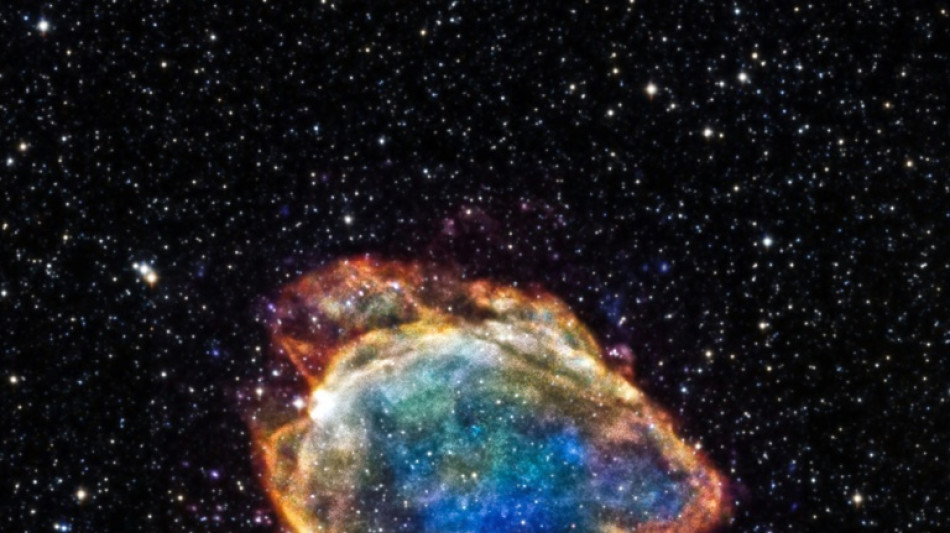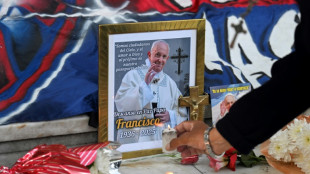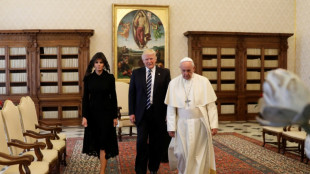
-
 Fleeing Pakistan, Afghans rebuild from nothing
Fleeing Pakistan, Afghans rebuild from nothing
-
US Supreme Court to hear case against LGBTQ books in schools

-
 Pistons snap NBA playoff skid, vintage Leonard leads Clippers
Pistons snap NBA playoff skid, vintage Leonard leads Clippers
-
Migrants mourn pope who fought for their rights

-
 Duplantis kicks off Diamond League amid Johnson-led changing landscape
Duplantis kicks off Diamond League amid Johnson-led changing landscape
-
Taliban change tune towards Afghan heritage sites

-
 Kosovo's 'hidden Catholics' baptised as Pope Francis mourned
Kosovo's 'hidden Catholics' baptised as Pope Francis mourned
-
Global warming is a security threat and armies must adapt: experts

-
 Can Europe's richest family turn Paris into a city of football rivals?
Can Europe's richest family turn Paris into a city of football rivals?
-
Climate campaigners praise a cool pope

-
 As world mourns, cardinals prepare pope's funeral
As world mourns, cardinals prepare pope's funeral
-
US to impose new duties on solar imports from Southeast Asia

-
 Draft NZ law seeks 'biological' definition of man, woman
Draft NZ law seeks 'biological' definition of man, woman
-
Auto Shanghai to showcase electric competition at sector's new frontier

-
 Tentative tree planting 'decades overdue' in sweltering Athens
Tentative tree planting 'decades overdue' in sweltering Athens
-
Indonesia food plan risks 'world's largest' deforestation

-
 Gold hits record, stocks slip as Trump fuels Fed fears
Gold hits record, stocks slip as Trump fuels Fed fears
-
Trump helps enflame anti-LGBTQ feeling from Hungary to Romania

-
 Woe is the pinata, a casualty of Trump trade war
Woe is the pinata, a casualty of Trump trade war
-
'Like orphans': Argentina mourns loss of papal son

-
 Trump tariffs torch chances of meeting with China's Xi
Trump tariffs torch chances of meeting with China's Xi
-
X rival Bluesky adds blue checks for trusted accounts

-
 China to launch new crewed mission into space this week
China to launch new crewed mission into space this week
-
Morocco volunteers on Sahara clean-up mission

-
 Latin America fondly farewells its first pontiff
Latin America fondly farewells its first pontiff
-
'I wanted it to work': Ukrainians disappointed by Easter truce

-
 Harvard sues Trump over US federal funding cuts
Harvard sues Trump over US federal funding cuts
-
'One isn't born a saint': School nuns remember Pope Francis as a boy

-
 Battling Forest see off Spurs to boost Champions League hopes
Battling Forest see off Spurs to boost Champions League hopes
-
'I don't miss tennis' says Nadal

-
 Biles 'not so sure' about competing at Los Angeles Olympics
Biles 'not so sure' about competing at Los Angeles Olympics
-
Gang-ravaged Haiti nearing 'point of no return', UN warns

-
 US assets slump again as Trump sharpens attack on Fed chief
US assets slump again as Trump sharpens attack on Fed chief
-
Forest see off Spurs to boost Champions League hopes

-
 Trump says Pope Francis 'loved the world,' will attend funeral
Trump says Pope Francis 'loved the world,' will attend funeral
-
Oscar voters required to view all films before casting ballots

-
 Bucks' Lillard upgraded to 'questionable' for game 2 v Pacers
Bucks' Lillard upgraded to 'questionable' for game 2 v Pacers
-
Duplantis and Biles win Laureus World Sports Awards

-
 US urges curb of Google's search dominance as AI looms
US urges curb of Google's search dominance as AI looms
-
The Pope with 'two left feet' who loved the 'beautiful game'

-
 With Pope Francis death, Trump loses top moral critic
With Pope Francis death, Trump loses top moral critic
-
Mourning Americans contrast Trump approach to late Pope Francis

-
 Leeds and Burnley promoted to Premier League
Leeds and Burnley promoted to Premier League
-
Racist gunman jailed for life over US supermarket massacre

-
 Trump backs Pentagon chief despite new Signal chat scandal
Trump backs Pentagon chief despite new Signal chat scandal
-
Macron vows to step up reconstruction in cyclone-hit Mayotte

-
 Gill, Sudharsan help toppers Gujarat boss Kolkata in IPL
Gill, Sudharsan help toppers Gujarat boss Kolkata in IPL
-
Messi, San Lorenzo bid farewell to football fan Pope Francis

-
 Leeds on brink of Premier League promotion after smashing Stoke
Leeds on brink of Premier League promotion after smashing Stoke
-
In Lourdes, Catholic pilgrims mourn the 'pope of the poor'


Record measurement of universe suggests 'something is fishy'
The most precise measurements ever made of the universe's composition and how fast it is expanding suggest "something is fishy" in our understanding of the cosmos, the astrophysicist who led the research said Wednesday.
The comprehensive new study published in The Astrophysical Journal further confirmed that there is a significant discrepancy between two different ways to estimate the speed at which the universe is expanding.
The study said that around five percent of the universe is made up of what we might think of as normal matter, while the rest is dark matter and dark energy -- both of which remain shrouded in mystery.
Dark energy, a hypothetical force causing the universe to expand at an ever-increasing rate, makes up 66.2 percent of the cosmos, according to the study published in The Astrophysical Journal.
The remaining 33.8 percent is a combination of matter and dark matter, which is also unknown but may consist of some as-yet-undiscovered subatomic particle.
To arrive at the most precise limits yet put on what our universe is made up of, an international team of researchers observed exploding stars called supernovae.
They analysed the light from 1,550 different supernovae, ranging from close to home to more than 10 billion lights year away, back when the universe was a quarter of its current age.
"We can compare them and see how the universe is behaving and evolving over time," said Dillon Brout of the Harvard–Smithsonian Center for Astrophysics and lead author of the study, called Pantheon+.
- Two decades of analysis -
The study updated the data from the Pantheon project a couple of years ago, stamping out possible problems and nailing down more precise calculations.
"This latest Pantheon+ analysis is a culmination of more than two decades' worth of diligent efforts by observers and theorists worldwide in deciphering the essence of the cosmos," US astrophysicist Adam Reiss, 2011's physics Nobel winner, said in a statement.
It was by observing supernovae back in the late 1990s that Reiss and other scientists discovered the universe was not only expanding but also doing so at an increasing rate, meaning galaxies are racing away from each other.
"It was like if you threw a ball up, and instead of the ball coming down, it shot up and kept accelerating," Brout said of the surprise of that discovery.
Pantheon+ also pooled data with the SH0ES supernova collaboration to find what is believed to be the most accurate measurement for how rapidly the universe is expanding.
They estimated the universe is currently expanding 73.4 kilometres a second every megaparsec, or 3.26 million light years. That works out to be around 255,000 kilometres (160,000 miles) per hour, according to a Harvard-Smithsonian statement.
But there's a problem.
- The Hubble tension -
Measuring cosmic microwave background radiation, which can look much farther back in time to around 300,000 years after the Big Bang, suggests the universe is expanding at a significantly slower rate -- around 67 kilometres per megaparsec.
This discrepancy has been called the Hubble tension, after US astronomer Edwin Hubble.
The Pantheon+ results have raised the certainty of the Hubble tension above what is known as the five sigma threshold, which means the discrepancy "can no longer be attributed to luck", Brout said.
"It certainly indicates that potentially something is fishy with our understanding of the universe," Brout told AFP.
Some possible, unverified theories for the discrepancy could include another kind of dark energy in the very early universe, primordial magnetic fields, or even that the Milky Way sits in a cosmic void, potentially slowing it down.
But for now, Brout said that "we, as scientists thrive on not understanding everything.
"There's still potentially a major revolution in our understanding, coming potentially in our lifetimes," he added.
J.Horn--BTB


